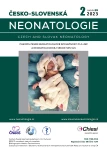-
Medical journals
- Career
Surfactant treatment
Authors: J. Termerová
Authors‘ workplace: Klinika gynekologie, porodnictví a neonatologie, 1. LF UK a VFN, Praha
Published in: Čes-slov Neonat 2023; 29 (2): 94-101.
Category: Contributions on respiratory problems of preterm newborns
Overview
Surfactant therapy is essential for the treatment of respiratory distress syndrome. A modern approach to the treatment of the syndrome is to use distension support with nasal continuous positive airway pressure, upon meeting the criteria to administer surfactant as soon as possible, using the gentlest, less invasive method, before injuring the immature lung. The goal is to avoid invasive positive pressure ventilation that is harmful and poses a risk of lung damage. If intubation is necessary during stabilization, the rule of thumb is to administer surfactant as soon as possible and direct the newborn to early extubation and non-invasive respiratory support. The following text focuses mainly on specific points of the European consensus guidelines on the management of respiratory distress syndrome: 2022 update.
Keywords:
surfactant, respiratory distress syndrome, distension support, nCPAP, meconium aspiration, pulmonary hemorrhage, bronchopulmonary dysplasia
Sources
- Bhandari V, Black R, Gandhi Bm et al. RDS-NExT workshop: consensus statements for the use of surfactant in preterm neonates with RDS. J Perinatol 2023; 43(8): 982–990.
- Ng EH, Shah V. Guidelines for surfactant replacement therapy in neonates. Paediatr Child Health 2021; 26(1): 35–41.
- Hoshino Y, Arai J, Cho K, et al. Diagnosis and management of neonatal respiratory distress syndrome in Japan: a national survey. Pediatr Neonatol 2023; 64(1): 61–67.
- Saugstad OD, Kirpalani H. Searching for evidence in neonatology. Acta Paediatr 2023; 112(8): 1648–1652.
- Vento M, Bohlin K, Herting E, et al. Surfactant administration via thin catheter: a practical guide. Neonatology 2019; 116(3): 211–226.
- Aldana-Aguirre JC, Pinto M, Featherstone RM, et al. Less invasive surfactant administration versus intubation for surfactant delivery in preterm infants with respiratory distress syndrome: a systematic review and meta-analysis. Arch Dis Child Fetal Neonatal Ed 2017; 102(1): F17–F23
- Roberts KD, Brown R, Lampland AL, et al. Laryngeal mask airway for surfactant administration in neonates: a randomized, controlled trial. J Pediatr 2018, 193 : 40–46.e1.
- Gallup JA, Ndakor SM, Pezzano C, et al. Randomized trial of surfactant therapy via laryngeal mask airway versus brief tracheal intubation in neonates born preterm. J Pediatr 2023; 254 : 17–24.e2.
- Bahadue F, Soll R. Early versus delayed selective surfactant treatment for neonatal respiratory distress syndrome. Cochrane Database Syst Rev 2012; 1(11): CD001456.
- Singh R, Gorstein SV, Bednarek F, et al. A predictive model for SIVH risk in preterm infants and targeted indomethacin therapy for prevention. Sci Rep 2013; 3(1): 2539.
- Challis P, Nydert P, Håkansson S, et al. Association of adherence to surfactant best practice uses with clinical outcomes among neonates in Sweden. JAMA Network Open 2021; 4(5): e217269.
- Capasso L, Pacella D, Migliaro F, et al. Can lung ultrasound score accurately predict the need for surfactant replacement in preterm neonates? A systematic review and meta-analysis protocol. Plos One 2021; 16(7): e0255332.
- Raimondi F, Yousef N, Rodriguez Fanjul J, et al. A multicenter lung ultrasound study on transient tachypnea of the neonate. Neonatology 2019; 115(3): 263–268.
- SurfON is trying to find out how best to treat babies born two to six weeks early with breathing problems [online]. 2023-0717 [cit. 2023-09-20]. Dostupné na: https://www.npeu.ox.ac.uk/ surfon.
- The PLUSS trial – preventing lung disease using surfactant – steroid [online]. 2022 [cit. 2023-09-20]. Dostupné na: https://www. plusstrial.org.
- Zimmermann LJI, Janssen DJMT, Tibboel D, et al. Surfactant metabolism in the neonate. Biol Neonate 2005; 87(4): 296–307.
- Coshal H, Mukerji A, Lemyre B, et al. Characteristics and outcomes of preterm neonates according to number of doses of surfactant received. J Perinatol 2021; 41(1): 39–46.
- Cummings JJ, Gerday E, Minton S, et al.; AERO-02 study investigators. Aerosolized calfactant for newborns with respiratory distress: a randomized trial. Pediatrics 2020; 146(5): e20193967.
- Olicker AL, Raffay TM, Ryan RM. Neonatal respiratory distress secondary to meconium aspiration syndrome. Children (Basel) 2021; 8(3): 246.
- Barnes ME, Feeney E, Duncan A, et al. Pulmonary haemorrhage in neonates: systematic review of management. Acta Paediatrica 2022; 111(2): 236–244.
- Hascoët JM, Picaud JC, Ligi I, et al. Late surfactant administration in very preterm neonates with prolonged respiratory distress and pulmonary outcome at 1 year of age: a randomized clinical trial. JAMA Pediatr 2016; 170(4): 365–372.
- The budesonide in babies (BiB) trial (BiB) [online]. 2023-07-21. [cit. 2023-09-20]. Dostupné na: https://classic.clinicaltrials.gov/ ct2/show/NCT04545866.
Labels
Neonatology Neonatal Nurse
Article was published inCzech and Slovak Neonatology

2023 Issue 2-
All articles in this issue
- PREFACE
- EDITORIAL
- Standardized procedure for stabilization and resuscitation of premature newborns
- Graded target saturation according to post-menstrual age
- Surfactant treatment
- Non-invasive pulmonary ventilation of newborns in CPAP and HFNC mode
- Basic principles of mechanical ventilation in immature newborns and used ventilation modes
- Systems for automatic oxygen dosing during artificial lung ventilation
- Outpatient care of infants with severe lung disease arising in the perinatal period
- Respiratory failure and ECMO in neonates
- A growing number of term newborns rehospitalizations and possible risks
- Pokyny pro autory
- Czech and Slovak Neonatology
- Journal archive
- Current issue
- Online only
- About the journal
Most read in this issue- Non-invasive pulmonary ventilation of newborns in CPAP and HFNC mode
- Surfactant treatment
- Standardized procedure for stabilization and resuscitation of premature newborns
- Respiratory failure and ECMO in neonates
Login#ADS_BOTTOM_SCRIPTS#Forgotten passwordEnter the email address that you registered with. We will send you instructions on how to set a new password.
- Career

